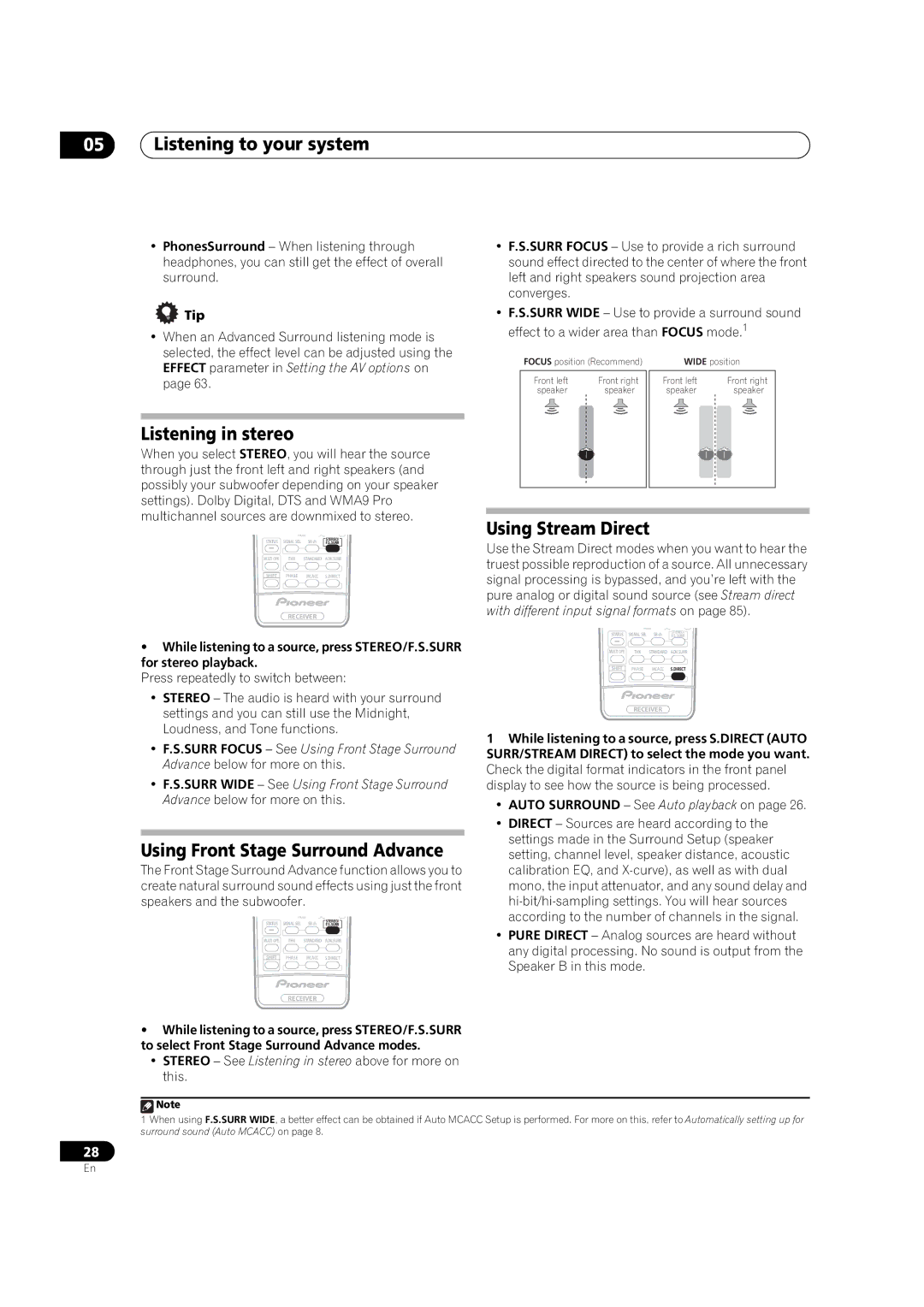
05Listening to your system
•PhonesSurround – When listening through headphones, you can still get the effect of overall surround.
 Tip
Tip
•When an Advanced Surround listening mode is selected, the effect level can be adjusted using the EFFECT parameter in Setting the AV options on page 63.
Listening in stereo
When you select STEREO, you will hear the source through just the front left and right speakers (and possibly your subwoofer depending on your speaker settings). Dolby Digital, DTS and WMA9 Pro multichannel sources are downmixed to stereo.
| PHOTO | STEREO/ | ||
STATUS | SIGNAL SEL | SBch | ||
F.S.SURR | ||||
MULTI OPE | THX | STANDARD | ADV.SURR | |
SHIFT PHASE MCACC S.DIRECT
RECEIVER
•While listening to a source, press STEREO/F.S.SURR for stereo playback.
Press repeatedly to switch between:
•STEREO – The audio is heard with your surround settings and you can still use the Midnight, Loudness, and Tone functions.
•F.S.SURR FOCUS – See Using Front Stage Surround Advance below for more on this.
•F.S.SURR WIDE – See Using Front Stage Surround Advance below for more on this.
Using Front Stage Surround Advance
The Front Stage Surround Advance function allows you to create natural surround sound effects using just the front speakers and the subwoofer.
| PHOTO | STEREO/ | ||
STATUS | SIGNAL SEL | SBch | ||
F.S.SURR | ||||
MULTI OPE | THX | STANDARD | ADV.SURR | |
SHIFT PHASE MCACC S.DIRECT
RECEIVER
•F.S.SURR FOCUS – Use to provide a rich surround sound effect directed to the center of where the front left and right speakers sound projection area converges.
•F.S.SURR WIDE – Use to provide a surround sound effect to a wider area than FOCUS mode.1
| FOCUS position (Recommend) | WIDE position |
| ||
| Front left | Front right | Front left | Front right |
|
| speaker | speaker | speaker | speaker |
|
|
|
|
|
|
|
|
|
|
|
|
|
|
|
|
|
|
|
Using Stream Direct
Use the Stream Direct modes when you want to hear the truest possible reproduction of a source. All unnecessary signal processing is bypassed, and you’re left with the pure analog or digital sound source (see Stream direct with different input signal formats on page 85).
| PHOTO | STEREO/ | ||
STATUS | SIGNAL SEL | SBch | ||
F.S.SURR | ||||
MULTI OPE | THX | STANDARD | ADV.SURR | |
SHIFT PHASE MCACC S.DIRECT
RECEIVER
1While listening to a source, press S.DIRECT (AUTO SURR/STREAM DIRECT) to select the mode you want. Check the digital format indicators in the front panel display to see how the source is being processed.
•AUTO SURROUND – See Auto playback on page 26.
•DIRECT – Sources are heard according to the settings made in the Surround Setup (speaker setting, channel level, speaker distance, acoustic calibration EQ, and
•PURE DIRECT – Analog sources are heard without any digital processing. No sound is output from the Speaker B in this mode.
•While listening to a source, press STEREO/F.S.SURR to select Front Stage Surround Advance modes.
•STEREO – See Listening in stereo above for more on this.
![]() Note
Note
1When using F.S.SURR WIDE, a better effect can be obtained if Auto MCACC Setup is performed. For more on this, refer to Automatically setting up for surround sound (Auto MCACC) on page 8.
28
En
